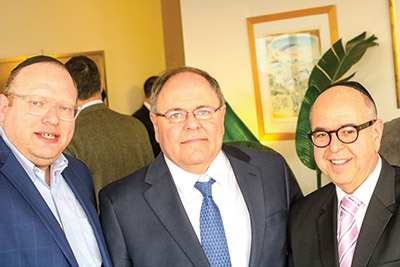
This past Friday, I attended a unique breakfast in Manhattan in the dining room of Israel’s Consul General, Ambassador Dani Dayan. In attendance were leading figures in the Jewish media world, the editors and top staff of the JTA, the Forward, the Jewish Week, Maariv USA, Jerusalem Post, Jewish Press, Jewish Insider, Chabad.org, to name a few. A number of staff from Israel’s Ministry of Foreign Affairs were also present for this relatively intimate get-together of 20 or so.
We gathered in the Consul General’s beautiful apartment with an expansive view of Manhattan. For security reasons, we were not told the address of the gathering until two days prior. Heavy security was in evidence in front of the building, the lobby and on the floor where the ambassador resides.
In a nod to the kosher-keeping attendees, Ambassador Dayan opened the gathering by noting the kashrut of the eggs and hot dishes and invited attendees to use plastic utensils and dishware if they did not feel comfortable using the embossed state of Israel utensils and plates.
The main purpose of the breakfast was, Amb. Dayan noted, “to get to know you (the Jewish media) in a more direct and personal way and to establish better contacts…Please don’t see this as a briefing…as there will be no major scoop.” He also stressed that the meeting’s goal was also “not to make the coverage more positive, but to make sure that the relationships between us are stronger.”
Dayan’s warm smile and general affability came through even at the relatively early hour. His jovial demeanor is among his hallmarks; he is a hard person to dislike.
In his opening remarks, he discussed the growing bipartisanship within the U.S. political scene and noted, with regret, that there “were no bipartisan issues anymore in the U.S.,” in a reference to the recent media reports indicating that support for Israel was weakening in the Democratic party. He explained that Israel “has a doctrine and strategy to be as close as possible to every U.S. administration” but he recognized with some sorrow that it was getting hard to be fully bi-partisan in today’s climate.
Dayan outlined a number of steps that he and the Israeli government are taking in an effort to ensure that Israel remains a bipartisan issue in the U.S. and to adapt to the changes in U.S. society. He emphasized his office’s strong efforts to reach out to the growing Latino community in the U.S. and noted that this was a community that must be cultivated. He also provided specifics as to exactly which Latino leaders and communities were being approached.
Addressing the perceived growing rift between the Jewish communities in the U.S. and Israel, he said that he sees the problem as a “lack of mutual knowledge.” He described the relationship as one that “needs a lot of marital counseling, but we as a community are far from divorce.”
Israelis, he noted, don’t see many issues in the same way that American Jews do. In Israel, “there are many layers of opinions,” he stated, and American Jews “have to understand it and be aware of it.”
The meeting grew slightly strained as the editor of the Forward and a writer from the Jerusalem Post both pressed home the point that the left-leaning American Jewish community, by and large, was feeling further and further alienated from Israel and its people over issues like the Kotel plaza and Palestinian relations and, more recently, immigration issues relating to Israel’s efforts to deport African refugees.
Dayan fired back, stating that he “is concerned that each side can only see their own issues and sensitivities today.” He also explained that Israelis cannot understand why major Jewish leaders protested and criticized the recent announcement that the U.S. would recognize Jerusalem as Israel’s capital and move the embassy to Jerusalem. Pointing out that practically every Israeli newspaper, from right to left, was ecstatic about the announcement, he exclaimed that he and many Israelis were “deeply offended when the Reform leaders and organizations protested.”
As the conversation grew a bit testy, a representative from the Jewish Press pointed out that the Orthodox community did not share these feelings of estrangement nor was there much sense of a rift between the American Orthodox community and the state of Israel. Dayan welcomed this comment. (After the breakfast ended, Dayan noted that he and his team will be working on setting up a similar gathering with the burgeoning Orthodox media in the U.S. as a number of other Orthodox publications were not represented at this meeting, in part due to space considerations.)
Ending on an upbeat note, one of the attendees noted that he had never attended a gathering like this one and welcomed this opportunity and other like it. In response and in closing, Dayan pledged to hold more such meetings in the future and wished us all a Shabbat Shalom.
By Moshe Kinderlehrer, Co-Publisher, The Jewish Link of New Jersey













